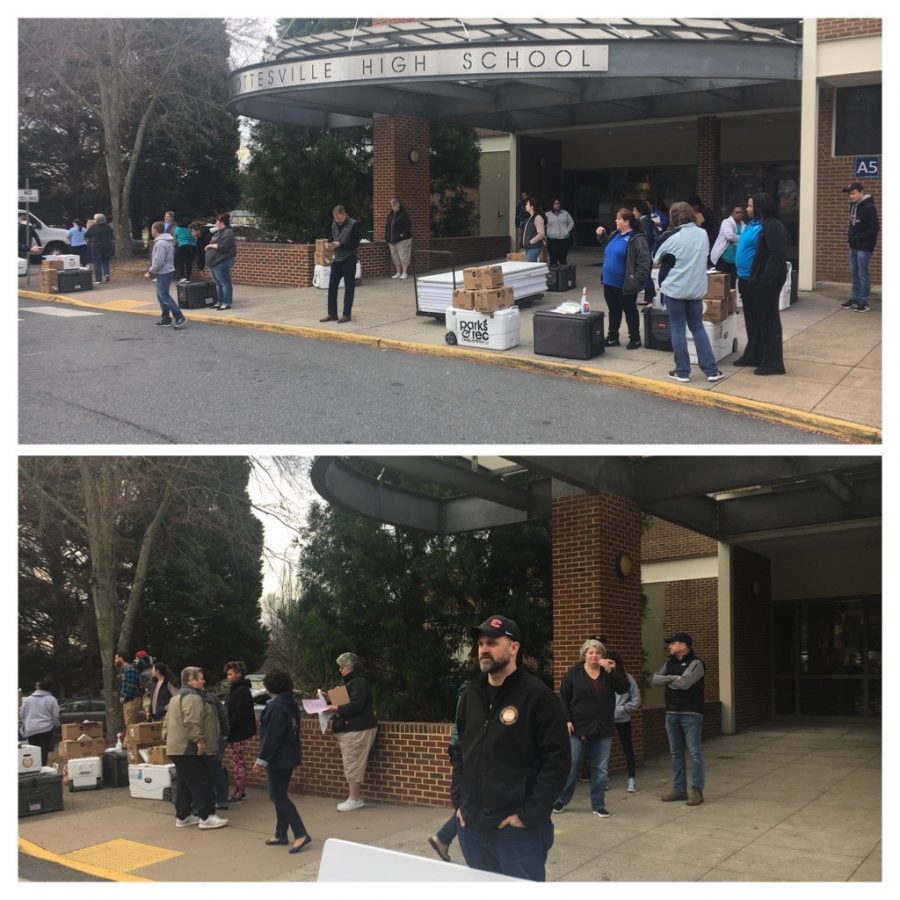Cultivating Community
School officials prepare to distribute meals.
May 10, 2020
Several people have falsely referred to the coronavirus pandemic as “the great equalizer,” hitting people from various socioeconomic and racial groups equally hard. Others have more accurately dubbed it “the great revealer,” exposing and deepening long-established vulnerabilities in our economic and political system.
This is particularly apparent when it comes to the issue of school lunches. While plenty of children in Charlottesville City Schools (C.C.S.) have never bought a school lunch in their lives, hundreds of students rely on those meals every day. With schools now closed and kids stuck at home indefinitely, countless students are faced with a shortage of meals during the day.
Thankfully, the school system has helped to carry some of the load. Every Monday and Wednesday, C.C.S. has been providing bags of food to students in need. These bags contain multiple days’ worth of breakfast and lunch, and are being distributed at pick-up sites around the community and via bus.
Carlton Jones, Charlottesville City Schools’ coordinator of nutrition, said the need “has been pretty consistent,” noting that the demand is averaging about “650 to 700 meals a day.” Both Mr. Jones and Eric Irizarry, the principal of Charlottesville High School, have viewed the initiatives as successful thus far. Dr. Irizarry went on to call them “hugely beneficial” to the community and said that “folks are grateful” for the assistance.
When asked about how these initiatives would continue, Dr. Irizarry said that “lunches are scheduled to go out from now until the end of the school year.” He also noted that the school system had yet to devise a plan to keep in-need students fed during summer break.
Denise Johnson, the Supervisor of Equity and Inclusion at Charlottesville City Schools, echoed this sentiment, saying that “nothing has been finalized at this time” when it came to the distribution of meals during summer break. Since the school system is not accustomed to feeding at-need students (“around 54% of [the] student population,” according to Ms. Johnson) throughout summer vacation, it remains to be seen whether or not C.C.S. will provide food over the break.
However, this uncertainty doesn’t inherently mean at-need students won’t be provided meals. In addition to C.C.S., several local organizations have helped to assist the community. The PB&J Fund, a local non-profit, is currently providing “weekend bags” to 350 families in the area. Cultivate Charlottesville, an assortment of non-profits, helped to carry the load when C.C.S. closed for spring break. Still, these groups haven’t been the only ones helping out.
Gabby Levet, a network associate at the Food Justice Network, cited numerous organizations that have helped in the quest to provide food to students. These organizations include The Chris Long Foundation, The Salvation Army, The Local Food Hub, and more. The groups have helped to provide transportation, funding, and fruit, and their services have proven to be invaluable to these initiatives. Meanwhile, one can only hope that the efforts of the school system and these local institutions will continue to make a difference in the lives of our community members.





